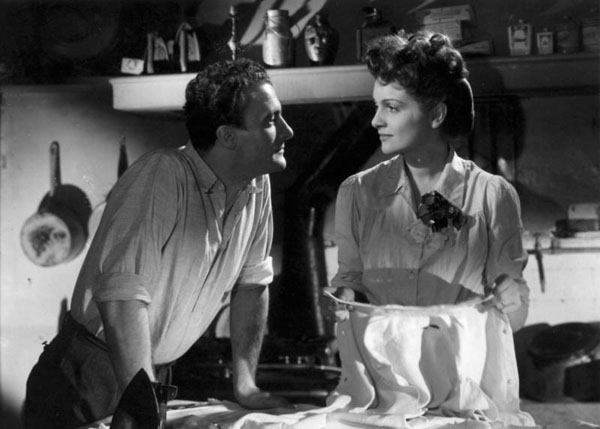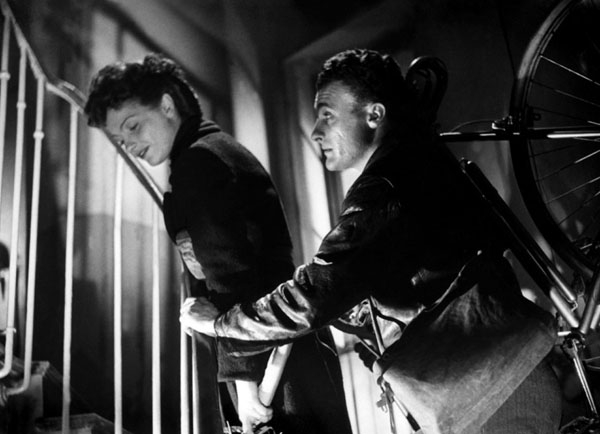“Antoine and Antoinette, Jacques Becker’s 1947 ode to the everyday life of working-class Parisians, opens amid the rhythmic, pounding machinery of a printing press,” begins Imogen Smith at the Chiseler. “Antoine runs a machine that slices the edges off book blocks: we see the blades coming down and the white strips of paper falling away. Narrative cinema in the Hollywood studio style is trimmed just as ruthlessly: all that’s extraneous, or that dulls the pace, is cut away. What makes Becker so radical a director was his interest in just these things that are usually discarded: the space around events, the in-between moments when we see people just being. He called it ‘dead time,’ but it is filled with life, whether it’s Jean Gabin’s middle-aged gangster making the bed and brushing his teeth in Touchez Pas au Grisbi (1954), or Antoinette ironing a new polka-dot dress while her husband listens to a ham radio in their little garret. It’s not a day in the life, it’s the life in a day.”
Antoine (Roger Pigaut) “works in a pulp publishing house,” explains Keith Uhlich in Time Out New York, while Antoinette (Claire Mafféi) “runs the photo booth in a department store, and even though they have to count every penny, they have a mostly picture-perfect life. But fate smiles a bit wider when Antoine discovers that his lovely wife has bought a winning lottery ticket. He just has to make sure he doesn’t lose it before he gets to the sweepstakes office…. Not only is this a human comedy, it’s a humane one.”
“Rather than immediately cashing in on their prize,” writes Aaron Cutler in the Voice, “the two take occasion to lie in bed and list the things they’d like to buy. Their shared fantasies of wealth form part of the dream called love, made real between two people through hope, hard work, and luck.”
At Slant, Bill Weber notes that “Becker and his vivacious cast of actors fill the milieu with types etched as artful miniatures: the lascivious grocer (Noël Roquevert) who plies Antoinette with free sardines, the callow boxer next door who’s more discreet about his flirting, the metro ticket seller who gabs while rush-hour commuters fume in line. Along with the colorful touches of Antoine clambering onto the roof of their garret to adjust the radio antenna, Antoinette’s lending library culled from her husband’s spoiled printings of pulp novels, and their weekend idylls in the soccer grandstand and a rowboat on a park lake, this human hubbub makes Pigaut and Mafféi’s attractive leads equally partners in love and members of a true community, aided immeasurably by Becker’s evocative location shooting and his zippy editing rhythms.”
“Becker, whose camera ranges breezily from metro-station ticket booths to romantic rooftops, is a sophisticate with a populist lilt,” writes the New Yorker‘s Richard Brody. And “Becker’s ecstatic, intimate closeups of the couple on a tender idyll burn away daily cares with the blinding heat of erotic passion.”
In the Notebook, Adrian Curry has not only gathered a couple of posters, he’s also found some terrific photos depicting posters for the film as they appeared in Paris in 1947. Antoine and Antoinette opens today at New York’s Film Forum and screens through October 3.
Update, 10/3: “At first exposure, we are likely to wonder what it is about Jacques Becker’s films that make them feel distinctive,” writes Dan Sallitt in the Notebook. “One clue to Becker’s sensibility is that, in a film the plot of which deals with the working class’s pained consciousness of its straitened financial condition, there is almost no dialogue to underline the theme, other than Roland’s offhand, mid-seduction comment to Antoinette near the end: ‘You workers live like sardines.’ … This restraint is not simply a matter of Becker being content to let images and story tell his tale instead of the script: rather, the entire tone of the film is displaced in the direction of pleasure, even as the plot speaks of need.”
For news and tips throughout the day every day, follow @KeyframeDaily on Twitter and/or the RSS feed. Get Keyframe Daily in your inbox by signing in at fandor.com/daily.





